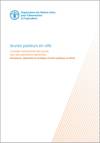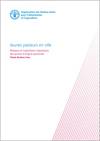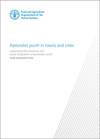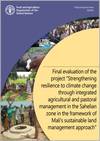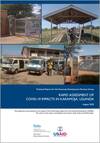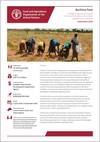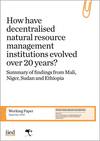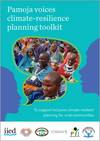Un faible niveau de scolarisation, l’absence de formation professionnelle et la marginalisation justifient une réflexion spécifique pour améliorer l’inclusion sociale et économique des jeunes pasteurs. Cette étude analyse le contexte institutionnel d’intégration des jeunes issus de milieu pastoraux en ville et les perceptions publiques au Tchad (Janvier 2019 à N'Djamena, Février 2019 à Dourbali). Trois enjeux principaux sont traités : la perception publique des migrations de jeunes des régions pastorales et du pastoralisme ; les services existants concernant ces jeunes ; les actions potentielles de soutien à l’intégration des jeunes migrants des régions pastorales vers les villes. Les principaux résultats de cette étude sont: Le manque de données résulte et entretient des divergences de perceptions entre acteurs publics sur les besoins des jeunes pasteurs au Tchad. La question du soutien aux jeunes pasteurs dans la société tchadienne ne constitue pas un enjeu d’action publique.
Year of publication: 2020Organization: Organización de las Naciones Unidas para la Alimentación y la Agricultura (FAO)
Topic: Género y juventud, Servicios sociales
Language: Français
Type of document: Técnico
Geographical coverage: África Occidental
Au Tchad, les migrations temporaires vers la Lybie, le Soudan et les sites d‘orpaillage sont entravées par la crise sécuritaire et réprimées par l’armée. La diversification des économies familiales pastorales varie selon les groupes (Kreda, Arabes, Peuls). Les institutions familiales et communautaires jouent un rôle clé dans l’intégration urbaine. Au Burkina Faso, les migrations sont stimulées par une crise pastorale complexe, aiguisée par l’affaiblissement des droits fonciers et le ralentissement du transfert inter générationnel des droits sur le bétail. Trois manières de prendre en compte ces nouvelles connections entre milieux rural et urbain sont: 1) soutenir les systèmes pastoraux; (2) fournir aux campements pastoraux des services sociaux de base, en particulier l’accès à l’éduction; (3) reconnaitre le droit de combiner la mobilité pastorale et l’accès aux droits civiques nationaux.
Year of publication: 2020Organization: Organización de las Naciones Unidas para la Alimentación y la Agricultura (FAO)
Topic: Economía, Género y juventud, Servicios sociales
Language: Français
Type of document: Técnico
Geographical coverage: África Occidental
The changes and constraints in the economy of the family pastoral economy are modifying the pathways to adult status for pastoralist youth in Chad and Burkina Faso. The study synthesized here focused on, on the one hand, the youth – men born in pastoral environments, who had migrated into towns and cities (Ndjamena, Dourbali, Ouagadougou, Bobo Dioulasso), identified in their migratory network, as witnesses and actors of those changes; on the other hand, stakeholders from public or community institutions concerned by these issues.
Year of publication: 2020Organization: Organización de las Naciones Unidas para la Alimentación y la Agricultura (FAO)
Topic: Género y juventud, Participación, Servicios sociales
Language: English
Type of document: Técnico
Geographical coverage: África Occidental
Mali is currently facing many challenges due to climate change that is significantly affecting all communities in the country, and agricultural producers in particular. In order to meet these climate challenges, the project aimed at building the capacities of agro-pastoralists in the Banamba, Kita and Niono districts to help them cope with climate change. With the exception of gender, the project strategy is sound and it reached the objective to boost the capacity of Mali's agro-pastoral activities to cope with climate change. A functional interactive community chat created by the project, as well as the Village Savings and Loan Associations set-up, are some of the elements that strengthen the resilience of agro-pastoralists and render project achievements more sustainable.
Year of publication: 2020Organization: Organización de las Naciones Unidas para la Alimentación y la Agricultura (FAO)
Topic: Cambio climático, Seguridad alimentaria, Tierra, Resiliencia
Language: English
Type of document: Técnico
Geographical coverage: África Occidental
This technical report describes the impacts of coronavirus disease 2019 (COVID-19) restrictions in the Karamoja sub-region of Uganda, based on field assessments in Amudat, Moroto and Abim Districts. The COVID-19 prevention guidelines that prompted total lockdown measures included market closure and travel restrictions which in turn affected the essential economic activities of many households, especially the poor. These restrictions were implemented in March 2020 and were still in place in August 2020.
Year of publication: 2020Organization: , , Agence des États-Unis pour le développement international
Topic: Sanidad, Resiliencia
Language: English
Type of document: Técnico
Geographical coverage: África Oriental
In Burkina Faso, the 2017/18 agropastoral campaign was marked by food and biomass deficits, the effects of which were exacerbated by the fragile situation in the country. Since January 2019, insecurity has continued to worsen due to recurrent attacks perpetrated by non-state armed groups, triggering massive population displacements, thus exacerbating the vulnerability of communities further resulting in increased humanitarian needs and significant challenges for the country. Thanks to funding from Sweden, FAO is supporting 18 700 households through various activities (cash-based interventions, agricultural and livestock production support) in order to meet their immediate needs, while ensuring that the root causes of their vulnerability are addressed in order to reduce dependency on food aid.
Year of publication: 2020Organization: Organización de las Naciones Unidas para la Alimentación y la Agricultura (FAO)
Topic: Seguridad alimentaria, Resiliencia
Language: English
Type of document: Técnico
Geographical coverage: África Occidental
Two decades ago, legal provisions gave local institutions rights to manage natural resources in four dryland African countries: Mali, Niger, Sudan and Ethiopia. This report examines how resilient such decentralised institutions have been, under the rapidly changing circumstances of the past two decades, and notes common lessons learned.
Year of publication: 2020Organization: Instituto Internacional de Medio Ambiente y Desarrollo (IIED)
Topic: Cambio climático
Language: English
Type of document: Técnico
Geographical coverage: África Occidental, África Oriental
The Pamoja Voices climate toolkit presents a simple and affordable methodology to identify the climate change adaptation priorities of men, women and young people using participatory learning and action methods. It is intended for use by local governments and community based organisations seeking to understand, represent and integrate local climate priorities into planning.
Year of publication: 2020Organization: Instituto Internacional de Medio Ambiente y Desarrollo (IIED)
Topic: Cambio climático, Género y juventud
Language: English
Type of document: Técnico
Geographical coverage: África Oriental


